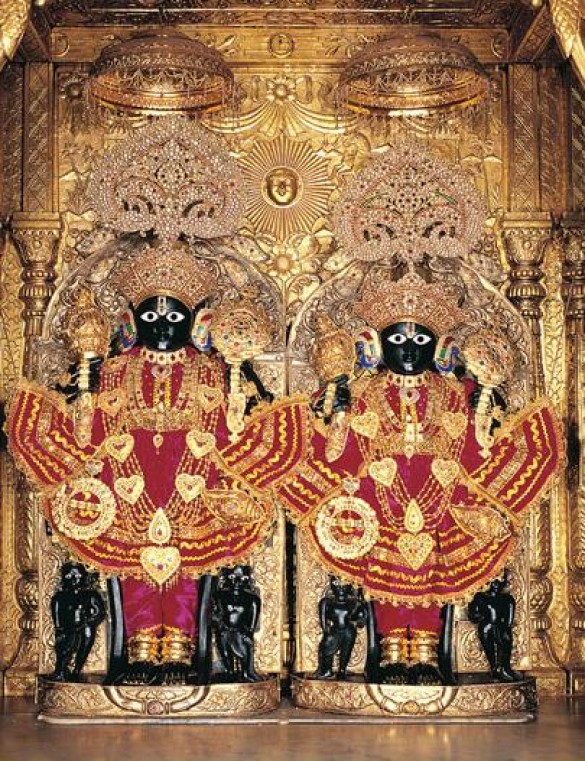
In the vast tapestry of Hindu mythology, few characters stand as epitomes of virtue, wisdom, and spirituality as Nara Narayana. This divine duo, composed of Lord Narayana (Vishnu) and Nara (Arjuna), embodies the union of the divine and the human, imparting profound teachings on the path of self-realization and devotion. The legend of Nara Narayana resonates throughout ancient texts, such as the Bhagavata Purana, Mahabharata, and various Puranas, capturing the essence of the eternal battle between good and evil, and the significance of righteousness in the cosmic order.
The story of Nara Narayana begins in the sacred abode of Badrikashrama, nestled amidst the majestic Himalayas. Here, Nara (also known as Narayana Rishi), the sage, and Narayana, the eternal deity, embarked on an arduous journey of penance and meditation. Their spiritual practice was an example of the highest form of austerity and discipline, inspiring seekers across ages to strive for self-realization.
The mystical and cosmic aspect of Nara Narayana's association becomes apparent when examining the tale of the churning of the cosmic ocean (Samudra Manthan). During this grand event, when the Devas and Asuras sought the nectar of immortality (Amrita), Mohini, another form of Vishnu, appeared to distribute the elixir. This episode, involving the trio of Nara Narayana and Mohini, exemplifies the intricate play of illusions and the divine's role in maintaining the balance between good and evil.
The Mahabharata, the great epic, also features Nara Narayana in its narrative. Arjuna, the great Pandava prince and hero of the Mahabharata, was considered an incarnation of Nara. His relationship with Lord Krishna (an avatar of Vishnu) highlights the eternal bond between Nara and Narayana. Krishna served as Arjuna's charioteer and spiritual guide during the Kurukshetra war, imparting the wisdom of the Bhagavad Gita, a profound dialogue on duty, righteousness, and devotion.
The teachings of Nara Narayana emphasize the concept of selfless action and devotion to the divine. The Bhagavad Gita's teachings, delivered by Krishna to Arjuna on the battlefield, underline the importance of duty (Dharma) and detachment from the fruits of actions (Karma). This wisdom continues to be revered as a guide to leading a purposeful life while staying dedicated to one's responsibilities and remaining equipoised amidst life's challenges.
Furthermore, the sacred relationship of Nara Narayana exhibits the idea of the ideal Yogi. Nara, the sage, represents the ascetic aspect, devoted to intense meditation and self-discipline, while Narayana embodies the divine aspect, manifesting as the preserver and sustainer of the universe. Their union exemplifies the harmony of spiritual practice and divine grace, signifying that the path to liberation lies in balancing renunciation and devotion.
The legend of Nara Narayana also demonstrates the significance of tapas (austerity) and penance in Hindu philosophy. The duo's intense penance and meditation in Badrikashrama exemplify the power of ascetic practices in realizing the self and transcending worldly desires. This aspect remains an essential part of the Hindu spiritual tradition, with seekers engaging in various forms of austerity to attain spiritual enlightenment.
Moreover, the Nara Narayana concept symbolizes the eternal relationship between the individual soul (Atman) and the universal soul (Paramatman). It emphasizes that the ultimate goal of human life is to realize the oneness with the divine, recognizing the divinity within oneself and all living beings.
In conclusion, Nara Narayana stands as an archetype of spiritual harmony, guiding humanity towards the path of self-realization and devotion. The divine duo of Nara and Narayana embodies the essence of righteousness, duty, and the eternal bond between the human and the divine. Their teachings continue to inspire countless seekers, encouraging them to tread the path of selfless action, meditation, and devotion to attain ultimate liberation. The legacy of Nara Narayana remains etched in the annals of Hindu mythology, continuing to serve as a beacon of wisdom and spiritual inspiration for generations to come.
Also read - Chanting these 108 names of Hanuman ji solves every problem
Sacred Stories: Why These Offerings Should Not Be Made on the Shivling
Offering Water to Shivling: Understanding the Correct Method